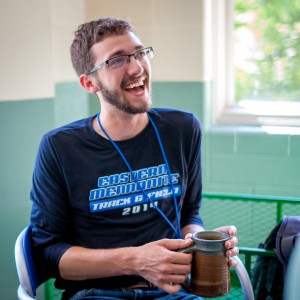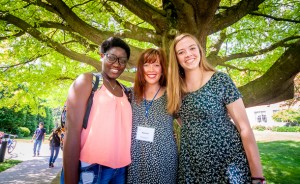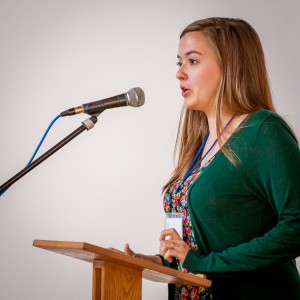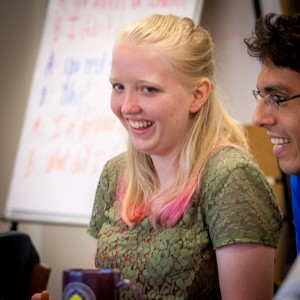This summer, four Eastern Mennonite University undergraduate students worked at the Summer Peacebuilding Institute, spending six weeks acting as hosts and ambassadors for approximately 145 international visitors.
They were often the first on campus to greet weary travelers arriving from the airport in the wee hours of the night, and they were integral members of the SPI community: interpreting cultural differences during casual conversations in Hillside Lounge, sharing field trips to Valley attractions and meals at the weekly international potluck dinners, and escorting guests to activities like Salsa Night and into downtown Harrisonburg for dinner.
“Our community assistants are a great addition to the SPI community in so many ways,” said director Bill Goldberg. “They were willing workers and cultural ambassadors, of course, but also representatives to the global peacebuilding community of the socially conscious, thoughtful young people who are attracted to and thrive at EMU.”
Tyler Eshleman: practicing the art of hospitality

Tyler, a senior peace and development major from Harrisonburg, works with the Center for Justice and Peacebuilding’s Strategies for Trauma Awareness and Resilience (STAR) program during the school year. Tyler has taken (STAR) Level 1 training and a graduate course in Transforming Trauma, and plans on earning a master’s in counseling. At EMU, he is the student leader of the Sustainable Food Initiative, which works to promote sustainability and social responsibility in food production and stewardship.
My most memorable experience at SPI is being part of the informal gatherings that people put together: going on a hike or making a meal or putting on a presentation for cultural night. I had a chance to see people from different backgrounds and cultures having a good time together, getting to know each other and teach each other, and breaking down cultural norms in the process.
Being hospitable means something different in every culture, and we had to learn to read people and be attentive to their needs, even when we are exhausted. The people who I meet at bizarre times of the night are often the people who I remained connected with throughout SPI. At first having to do this was kind of a shock and then I realized it was a great opportunity.
The opening ceremonies that started each session were really special. The participants introduced themselves and shared about themselves to the group. I found those moments to be a testament to the recognition of how we’ve shaped this community and how people are willing to share with intimacy and vulnerability.
Winifred Gray-Johnson: inspired by the dedicated work of others

Winifred is a junior economics major from Liberia. Her father Wilfred Gray-Johnson, executive director of the Liberia Peacebuilding Office of the United Nations Peacebuilding Fund Secretariat, first came to SPI several years ago and Winifred eventually found her way to EMU from that family connection (read about Winifred and her father). She had heard stories about SPI from her father but this was her first summer of experiencing it herself. Winifred is president of the International Student Organization.
Participants of SPI are very interested and curious about other cultures and want to share about their own culture. When you’re checking them in, the conversation starts right there. They want to know what EMU is like, what it’s like to be a student at EMU, and when they catch up on my accent, they ask where I was from. It’s not just with me. They will start a conversation with whoever is in the lodging.
To hear the amount of passion and determination is really amazing. So many people come to SPI from war zones or from situations with disasters or refugees in camps, and they have such interest and drive and hope. To see the hope they carry is really good.
It makes me very eager to do something, to work on something. All these people from all these different organizations who are doing such amazing things. There was this one man, Taziwa [Machiwana], working with young girls in Zimbabwe and one day, I said, “Oh, I envy you, I want to do what you are doing.” There is so much variety. Anybody and everybody can impact change. It gives you that eagerness to help in whatever way you can, not just sit back.
At university, you are modeling yourself to become this person who can help society in the future. SPI has definitely helped me model myself in that kind of way. In this job, we are asked to be accommodating and helpful. I have learned how to work with all kinds of people here, both in my education at EMU, but especially at SPI. It’s one thing to say that I like everybody, but it’s another to really have to practice what you preach. I’ve left a couple of situations where I said to myself, “I didn’t know I had it in me,” or “I handled it well.” I definitely surprised myself sometimes.
Bethany Chupp: transitioning through cultures

Bethany, a junior psychology major with minors in art and theater, is from Canby, Oregon. Bethany spent last year as a community assistant in Residential Life on campus and also worked several summers at a camp on the Oregon seashore: in both positions, she helped to acclimate sometimes disoriented and bewildered newcomers. Bethany plans to pursue a degree in counseling, with the goal of specializing in art therapy with children who have experienced trauma in foster care and adoption.
When people would find that I’m not from Virginia, I would tell them I was from “Oregon, which is by California,” because most people know where California is. And then we had something to talk about right from the start, because with my seven-hour flight [from California to Virginia], we had travelled about the same distance to get to SPI.
I was on my cross-cultural semester to the Middle East in the spring before SPI, so I really hoped that SPI would help with the transition back to the U.S. and to campus. And it did. At SPI, there was first a professor from Palestine and then later a woman from Jerusalem. Talking to them, it was amazing how familiar they felt, even though I didn’t know them personally. The woman from Jerusalem knew the people in the town I stayed in during my cross-cultural. She knew my host family and the places we visited, and that was really helpful.
One thing that struck me was that these people have all accomplished a lot, yet when coming into a new situation, they all have fears … they’re all new here and vulnerable. But they all found ways to relate beyond language and culture, especially I think because they are people striving for the same common goals.
It can be overwhelming to learn about so many issues that need work, but it’s inspiring seeing people working in these areas. Many are coming to the US for the first time, and English isn’t their first language, and they are struggling, but because they’re so passionate about what they’re working for, they’re willing to cross all those spaces to learn skills to help bring peace.

Rebekah York: SPI community is a source of energy, hope
Rebekah is a senior majoring in peacebuilding and development and with minors in psychology and theater. Raised in Bucharest, Romania, Rebekah worked this summer at SPI and also as an intern with the Washington D.C. office of ActionAid, a South-Africa human-rights focused development organization.
Being a part of the SPI family was an incredibly life-giving experience. There is something so unique and special about people from all over the world sharing the same space, classrooms, lunch tables and even dorm rooms. It makes me feel at home.
What I always think of when I reflect on SPI are the potluck dinners and the many one-on-one conversations. During these gatherings, people opened up and shared details about their lives. Nothing can take the place of those moments in which we sit together — sometimes in silence, sometimes just as a listener –in which the human heart is open and exposed for a short time.
I was also able to take the Restorative Justice class with one of my most admired professors. That is not something every college student gets to experience and it was fascinating to interact with my professor in that environment. We even worked on a project together and presented it in class with another SPI participant.
If you’re looking for a place to rejuvenate your sense of hope in the world, SPI is the place for you. Solving conflict is difficult and it is easy to become cynical and apathetic. You may feel like nothing good is happening today. But during SPI, people with life experience and a true desire to bring lasting change and peace to the world gather together to learn from each other, lighting the fire of hope for a peaceful world in the hearts and minds of everyone.

Wonderful, inspiring, well-written stories! Thank you so much. May you continue in God’s hope and peacebuilding!